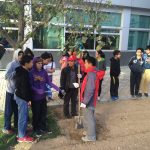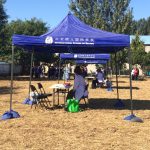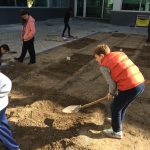The alarm reverberated across the entire school. Instinctively, every student dropped to the ground, gripping the legs of their table tightly in preparation for an ensuing earthquake. The earthquake never came. Instead, a voice rang over the loud speaker: “Remain calm. Listen to your teachers. Please evacuate the premises in an orderly fashion.”
Evacuate? Why would they be asked to evacuate if there was an earthquake? Students had any idea what was going on.
Teachers helped load students onto pre-prepared busses at the front of the school. Many of them didn’t even have a backpack.
The busses drove students to an abandoned field 30 miles from the school. Disaster tents lined the field- each set up for a different purpose; some provided water and meal rations, while others provided emergency first aid or means of personal identification. Every student was now a refugee.
The Phoenix Project
The scenario I described above was the launch for the ‘Phoenix Project’ at The International School of Beijing. The cross- curricular project was designed to help grade 7 students better understand what life was like for a refugee, through becoming one themselves. In the project, they would be responsible for growing their own food, establishing a system of law and government, and determining what role each member would have.
The Driving/ Essential Question:
As members of a new society, how do we feed and govern ourselves?
How do you excite wonder and curiosity from your learners? As teachers, while it is easy to develop activities, lessons or projects, it is far more difficult to come up with the questions that drive these learning experiences. Great questions inspire, motivate and engage our learners. Instead of waiting to learn from the teacher, great questions help put students in the driver’s seat; acting as anthropologists, historians, scientists and mathematicians in determining the answers.
How to Write Great Driving/ Essential Questions
Here are six things to consider when writing an essential/ driving question to invite WONDER from your learners:
- W orthwhile: Essential questions should be related to what experts in the real field do. They should direct learners to meaningful work that help learners link concepts/ principles across disciplines.
- O pen-Ended: Great questions allow for multiple answers. They can’t be googled or ‘binged.’ They are often solution oriented, asking students to solve problems in new, novel ways. Think, ‘How can we..’
- Create a ‘Need to Know’ for rigorous standards/ skills: While great driving questions are accessible to the learner, they should also require deep investigation to fully answer. In this way, content found in a textbook, curriculum guide, or on the internet becomes more meaningful and integrated in a way that helps the learner develop answers for themselves.
- D ictate parameters: While great questions are open- ended, in the case of a project, they also provide parameters to ensure deeper, meaningful learning. They are not the source of endless hours of philosophical debate and ramblings; but rather action- oriented around specific, tangible problems or ideas. For example rather than say, ‘How do we solve global warming?’ they instead read, ‘How might we lower our carbon footprint at home and school?’
- E asy to Understand: Great questions are accessible to the learners we teach. While we might ask middle school students to ‘use principles of entrepreneurship to help address a community need,’ for second grade students we would instead ask, “How can we use the magic of business to turn $5 into $100?”
- R elevant: Great driving questions are relevant to students’ lives and their communities. For example, it would be far more relevant to ask students with limited recreation areas a question around how to ‘increase play space’ than it would to ask a question around designing a new amusement park.
How to Create Driving Questions (Download the poster to hang in your classroom)
Some Sample Driving Questions:
How do we use the principles of entrepreneurship to meet a community need?
What impact do humans have on our local watershed, and how can we better protect them?
How can we use public spaces to show how life is different for people on the other side of the border?
How do we recreate the values of society from the artifacts they carried with them?
How do we use data to make a positive impact on a local waterway?
How can we plant positive seeds of culture that will grow and flourish for years to come?
How can we create an affordable play area that is safe and accessible to all students?
How do circuits improve our lives?
How can humans create sustainable and efficient modern ecosystems?
Write a Driving Question Together
Having trouble coming up with a driving question? No sweat. Let’s create one together. Reach out to me at kylewagner@transformschool.com, share a bit of your project idea, and we can brainstorm some ideas for a question that drives it.
With students ALWAYS first,
Kyle



